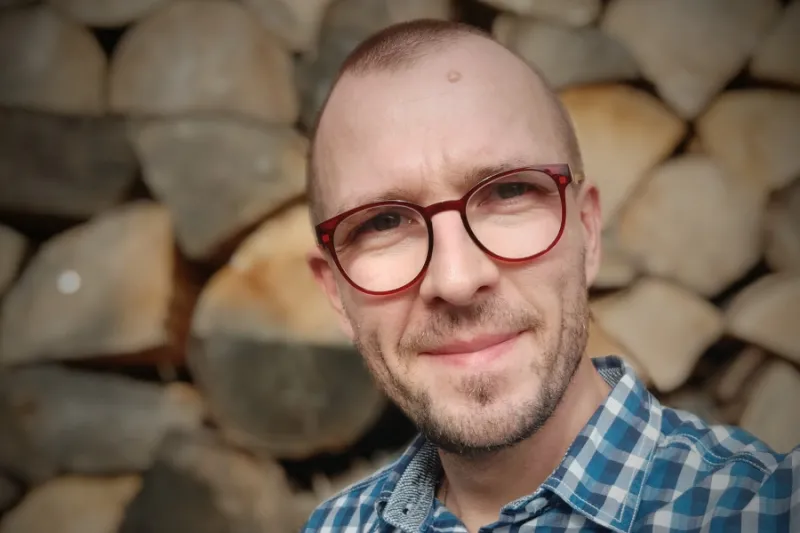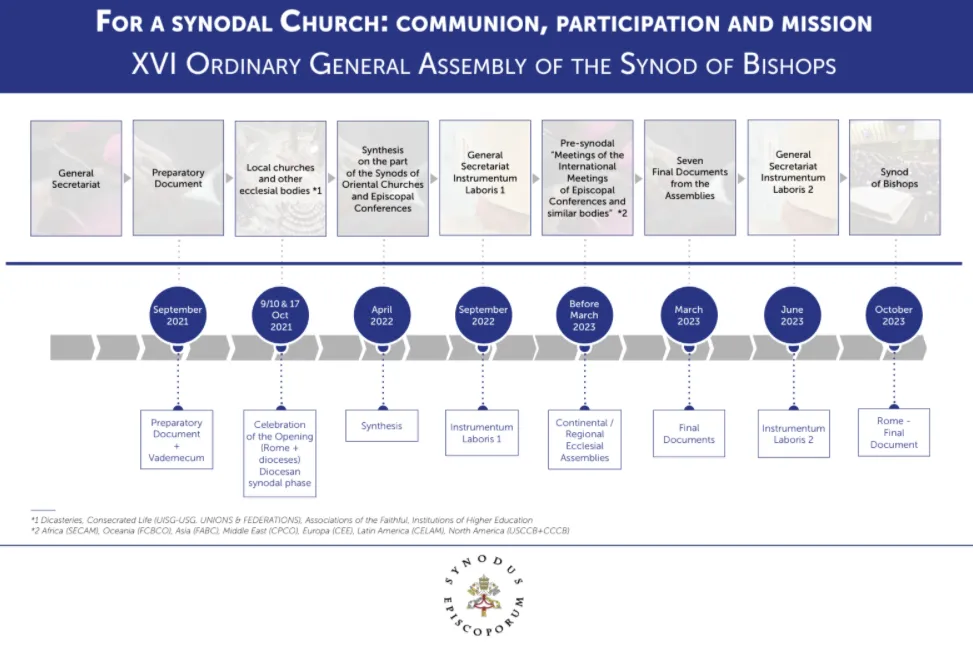
Warsaw, Poland, Aug 30, 2021 / 07:30 am (CNA).
A Catholic layman will represent the Church in Poland at the official opening of the synodal process leading to the 2023 synod of bishops meeting in Rome.
Aleksander Bańka, a professor at the University of Silesia in Katowice, southern Poland, was appointed as a delegate of the Church in Poland by Archbishop Stanisław Gądecki, president of the Polish bishops’ conference.
Bańka will be part of a contingent of 10 people representing Europe, comprising Cardinal Angelo Bagnasco, president of the Council of European Bishops’ Conferences (CCEE), two bishops, and seven lay people.
The appointment was first mentioned publicly on Aug. 25, when Poland’s bishops announced that “for the first time, a lay person will represent the Church in Poland at the inaugural session” of the synodal process.
Bańka was named as the representative in an Aug. 30 press release on the Polish bishops’ website.
The Vatican said in May that the synod of bishops meeting in 2023 would begin with a two-year consultative phase involving Catholic dioceses around the world.
The synodal process will officially open with a “diocesan phase” in October 2021 and conclude with the XVI Ordinary General Assembly of the Synod of Bishops at the Vatican, on the theme “For a Synodal Church: Communion, Participation, and Mission,” in October 2023.
Cardinal Mario Grech, the general secretary for the Synod of Bishops, said that the synod had been transformed “from an event into a process.”
The two-year “synodal path” will be inaugurated in Rome on Oct. 9-10. The initial diocesan phase will be followed by continental assemblies and culminate in the meeting of the world’s bishops in Rome.

Bańka, a husband and father, works at the Institute of Philosophy of the Faculty of Humanities at the University of Silesia.
The author of many books and articles, he specializes in the history of philosophy, the philosophy of religion, and the intersection of philosophy and psychology with Christian spirituality.
He served as chairman of the Commission for the Laity during the second synod of the Archdiocese of Katowice and is associated with the Center of Spirituality of the Movement Light-Life in Katowice archdiocese.
In a 2017 article, “Youth and Experience of Living Faith : The Essential Aspects of the Path to Christian Maturity,” Bańka reflected on declining participation in the Church among young people in Poland.
“Often actions undertaken within the scope of the New Evangelization are taken tongue-in-cheek or even with hostility or as an oddity, clutter spreading, or cheap entertainment,” he wrote.
“Often it is connected with some reluctance towards new communities and Church-renewal movements, which in some parishes are — speaking openly — unwelcomed or treated as an element of local parish color.”
“Potential hidden in these communities remains undiscovered and unused; it even happens sometimes that the laity organizing in a given community — mainly young people — are left to their own means.”
If you value the news and views Catholic World Report provides, please consider donating to support our efforts. Your contribution will help us continue to make CWR available to all readers worldwide for free, without a subscription. Thank you for your generosity!
Click here for more information on donating to CWR. Click here to sign up for our newsletter.





Is it possible to walk and chew gum at the same time? This is the challenged posed by the synodal way. We read: “Cardinal Mario Grech, the general secretary for the Synod of Bishops, said that the synod had been transformed “FROM AN EVENT INTO A PROCESS.”
What about BOTH an event and a process, the irreducible difference between what the Church IS and what it merely DOES? We have this concise meditation on escatology and/versus history or process:
“The prae [before] of God’s action [!]: this means not just the preeminence of history [“process”] over metaphysics [alleged “ideas”] but also the rejection of a purely existential version of the gospel message—quite simply because the gospel message means the primacy of the ‘in itself’ over the ‘for me’, because it excludes the intermingling [! the intermingled halfway-house of fluid synodality?] of the ‘in itself’ with the ‘for me’ that was introduced by Luther and reached its utmost radicality in existential theology [….] Thus the prae of God’s action means, ultimately, that actio is antecedent to verbum, reality to the tidings of it” (Ratzinger, “Principles of Catholic Theology,” 1987, pp. 184-188).
TRANSLATION: The Christian eschaton has taken place, already (!), within history, rather than at the end of history or as a construct emanating from any lesser and ongoing process.
The Resurrection is the defining reality and “event” of the living God: “Jesus Christ is the same yesterday and today and forever” (Heb 13:8). “The Christian dispensation, therefore, as the new and definitive covenant, will never pass away, and we now await no further new public revelation [!] before the glorious manifestation of the Lord Jesus Christ (cf 1 Tim 6:14, Tit. 2:13)” (Dei Verbum, n. 4).
So, let’s go for a walk, and with the gum (“in itself”) and never without it…
By “fluid synodality” (my term, above), our worst nightmare would be a suspended-but-not-adjourned council-look-alike, mimicking Vatican I, which as a council was only “suspended” (not adjourned) until it found closure, still, in Vatican II.
And, just as Vatican II was convened by one pope who then dropped from the scene, and was carried by another. Just as the 2018 Synod on Youth’s final report concluded with a lengthy call for synodality—-appended later by cleric rather than the youth synod itself (!). Just as the synod on synodality in 2023 is to be convened by the apparent lame-duck Pope Francis, possibly then to be followed by an endless and rolling “process” of synodality.
So, in 2023 a synod that also declares its work unfinished, this time such that Church councils as an institution are displaced by provisional—-horizontal and even mutually contradictory?—-yes, engaged but also decapitated continental synods (like the “provisional” Agreement with atheist China, and like the “pluralist” Abu Dhabi Declaration with the insular world of Islam).
No wonder, under the pending reform of the curia, that the Congregation for Doctrine of the Faith (CDF) is likely to be subordinated to the pragmatic Secretariat of State and a new super-dicastery of Evangelization. Who needs the deposit of faith (with morals) and a confidently and skillfully teaching Church, anyway?
But who am I to have this nightmare? Who am I to speculate? Yes, Vatican II’s aggiornamento toward this centrifugal “modern” world, “in season and out of season,” is admittedly a tough course to discern…
But the answer, delegated by the incarnate Christ, is it really an open-ended and patchwork version of synodality—-the Barque of Peter without a rudder?
But, with the right leadership, the synod on synodality could be just the place to figure this stuff out.
Let the Process begin. Poland’s hierarchy seems to this writer banking on a learned professor Aleksander Bańka to hold the conservative line, who as a layman also lacks the authoritative credentials thereby weight on decisions that conservative hierarchy might disagree with. My initial thought was a clever foil. Perhaps not. Although anyone, even without a theological philosophical background didn’t need to read the tea leaves when Cardinal Grech spoke of synodal “prophetic discernment” to CNA Vatican. Events are not necessarily modifying and transformative. A process is. The latter is especially true with moral and theological doctrine. Whether a doctrinal hermeneutic of continuity is retained is at issue, although prophetic discernment says otherwise. If the latter is to try us, I pray for myself and all. Fac me tuis semper inhaerere mandatis, et a te numquam separari permittas.
In the interests of a muddled hermeneutics, not to mention fortrightness or whatever, at least three of those named for key positions at the front end of the synodal “process” toward the 2023 synod on synodality are either (a) favorable to a married priesthood (no distinction between alter Christi and simply good homilies by deacons who are married) and female ordination (ruled permanently off the table by Pope Francis citing Pope St. John Paul II: Ordinatio Sacerdotalis, 1994), or (b) are opposed to objective moral absolutes in matters of human sexuality and family, or (c) misrepresent Vatican II as actually replacing hierarchy (the Apostolic Succession) with amorphous collegiality rather than as consistently hierarchical (a balanced “hierarchical communion” (Lumen Gentium, ch. 3 and Explanatory Note).
Others named, also with good formal credentials, are not so problematic and even inspire confidence. Such partial results follow just ten minutes of name-tracking over the internet:
https://www.catholicnewsagency.com/news/248429/members-of-commissions-preparing-synod-on-synodality-unveiled